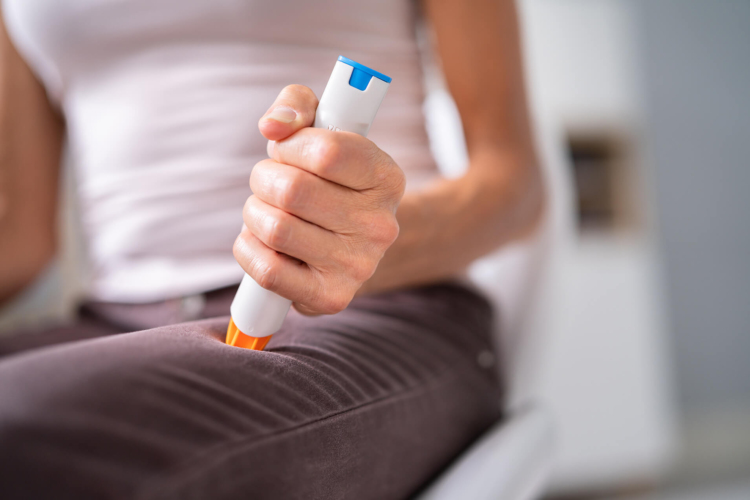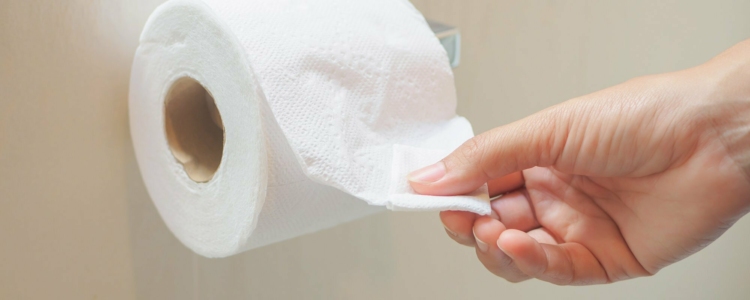What Are the Symptoms of Gas and Bloating?
Gas and bloating can appear in several ways:
- A swollen or “bloated” belly from intestinal gas buildup;
- The urge to burp or pass gas;
- Intestinal cramping or abdominal gas pain;
- Discomfort or pressure in the abdomen;
- Gurgling or rumbling sounds;
- Spasms or twisting sensations;
- Trapped intestinal gas, sometimes painful on one side.
These symptoms are usually mild, but they can be uncomfortable if they become frequent.
What Causes Intestinal Gas and Bloating?
Most intestinal gas is part of normal digestion. On average, people pass gas between 13 and 21 times daily. Certain circumstances, however, can increase gas production or make bloating more noticeable.
Indigestion
Foods that are harder to digest slow down intestinal movement, causing bloating, cramping, and sometimes excessive gas.
Swallowing Too Much Air (Aerophagia)
Aerophagia refers to swallowing more air than normal. We all swallow a small amount of air naturally when we eat, drink, or even simply swallow saliva. However, certain daily habits can increase the amount of air entering the stomach and make it “work empty,” which can lead to bloating or abdominal pressure.
Common causes include:
- Eating too quickly;
- Talking or drinking while eating;
- Drinking very hot beverages;
- Chewing gum;
- Using a straw;
- Smoking;
- Nasal congestion that increases mouth breathing.
These habits may seem minor, but when repeated regularly, they can significantly contribute to intestinal gas and bloating. Slowing down your eating pace, drinking calmly, and avoiding behaviors that increase swallowed air can help reduce these symptoms.
Foods That Cause Intestinal Gas
Certain foods naturally produce more fermentation during digestion, leading to intestinal gas and bloating.
Twelve common triggers include:
- Cabbage
- Broccoli
- Cauliflower
- Brussels sprouts
- Legumes (beans, lentils, chickpeas)
- Mushrooms;
- Onions
- Leeks
- Asparagus
- Whole grains (wheat, oats, barley)
- Carbonated beverages and beer
- Dairy foods, especially with lactose intolerance
Why these foods?
Their digestion naturally produces more fermentation, which generates a greater amount of gas. Some of these foods are also high in complex carbohydrates that the intestines have more difficulty breaking down.
Food Intolerances
Certain food intolerances can also be responsible for gas, bloating, cramps, or a swollen belly. The most common is lactose intolerance, which is linked to the sugar naturally present in dairy products. When the body does not produce enough lactase, the enzyme needed to digest lactose, it ferments in the intestines and causes gas, bloating, gurgling, or even diarrhea.
Lactose Intolerance
Lactose is a sugar naturally found in dairy products. Lactose intolerance is characterized by bloating, abdominal pain, and sometimes even diarrhea alternating with constipation. Symptoms can appear between 30 minutes and 2 hours after consuming lactose.
Many lactose-free products are now available in most grocery stores, as well as dairy-free alternatives (such as soy milk). However, these options are not always as rich in calcium and vitamin D. It is therefore very important to get enough of these nutrients (for example, through supplements).
Consult a nutritionist who can advise you on lactose-free foods that may be right for you. If avoiding lactose is impossible or too complicated, lactase enzyme supplements are also available at the pharmacy so you can still consume some dairy products.
Ask your pharmacist affiliated with Accès pharma chez Walmart for advice on these supplements.
Aerogastria (Commonly Called “Eating Too Much”)
Aerogastria refers to bloating or the feeling of a “swollen” belly resulting from an accumulation of intestinal gas. Bloating is often felt after a meal that is too large or too rich in fat or sugar.
Stress
The body reacts biologically to anxiety by redirecting blood flow away from the digestive system toward the brain and limbs. This natural shift in the nervous system can cause intestinal contractions, slower digestion, and increased aerophagia (swallowing too much air). Together, these mechanisms often lead to gas and bloating.
During periods of stress, the digestive system may:
- Slow down its activity, which promotes bloating
- Increase aerophagia (eating too quickly, breathing more through the mouth, swallowing more air)
- Trigger or amplify the sensation of trapped gas
- Cause abdominal pain linked to intestinal contractions
Stress is not dangerous in itself for the intestines, but it can worsen existing symptoms and make digestion more uncomfortable.
Bacterial Overgrowth (SIBO)
Also known as SIBO (small intestine bacterial overgrowth), this refers to an increased presence of bacteria in the small intestine. These bacteria, which should normally be found in the large intestine (the colon), result from a dysfunction of the digestive system often caused by stress, diet, or an underlying illness.
Smoking
Nicotine in tobacco increases the acidity of the stomach. See our advice on smoking cessation as well.
Exercise
Very high-intensity exercise can lead to bloating, while very infrequent physical activity slows colon contractions, which also causes bloating. Finding a balance is essential.
Pregnancy
Pregnancy causes many hormonal and physical changes that can affect digestion. The increase in progesterone naturally slows intestinal transit, which can promote bloating, the feeling of a swollen belly, and gas buildup.
The pressure of the growing uterus on the intestines can cause flatulence. In addition, many pregnant women experience episodes of constipation during pregnancy, which also leads to increased gas production. This slower transit, combined with hormonal fluctuations, can make digestive symptoms more frequent and sometimes more uncomfortable than usual.
Some daily habits, such as eating smaller portions, moving gently after meals, and staying well hydrated, can help relieve this discomfort.
To learn more, see our content on digestion during pregnancy.
Which Health Conditions Can Cause Gas and Bloating?
In some cases, digestive diseases can also cause persistent gas and bloating.
Several digestive conditions may explain frequent gas:
- Irritable bowel syndrome (IBS)
- Crohn’s disease
- Celiac disease
- Hypothyroidism
- Type 2 diabetes
- Other medical conditions can also cause gas and bloating, such as:
- Stomach ulcer
- Gastrointestinal infection
- Food poisoning
- Appendicitis
How to Get Rid of Intestinal Gas Quickly?
Trapped gas can be uncomfortable and even painful. Here is what may help:
- Take a 10- to 15-minute walk
- Gently massage the abdomen in a clockwise direction
- Apply a hot water bottle or gentle heat
- Practice deep breathing
- Avoid positions that compress the abdomen
If the pain is intense, localized on the right side, or accompanied by other symptoms, consult a doctor.
What Can You Do to Reduce Intestinal Gas and Bloating?
Once the source of gas and bloating is identified, it is usually fairly simple to address. A consultation with your pharmacist affiliated with Accès pharma chez Walmart will certainly help you make an informed and safe choice.
Keep a Food Diary
It can be difficult to identify the source of digestive discomfort when you eat many different foods. Taking the time to note the time and content of your meals each day, along with the timing and intensity of your symptoms, makes it easier to pinpoint the culprit.
Adjust Your Diet
A few changes to your diet can be beneficial to relieve gas and bloating:
- Eat more fiber
- Drink plenty of water
- Eat smaller meals more regularly so the intestines can work more frequently
- Reconnect with your hunger signals and listen to your body to avoid eating portions that are too large
Swallow Less Air (Reduce Aerophagia)
- Avoid talking or drinking while eating
- Avoid chewing gum
- Reduce your intake of beer and carbonated drinks
- Eat more slowly
- Avoid drinking with a straw
Exercise Regularly
This can be as simple and enjoyable as a walk after meals. Moving after eating stimulates the body, and therefore the intestines.
Learn to Manage Stress
Many techniques or activities can help manage anxiety, such as breathing exercises, meditation, physical activity, or yoga. See our resources on this topic to learn more.
Quit Smoking
Nicotine in tobacco increases stomach acidity, causing gas and bloating. In addition, the act of smoking makes you swallow more air (aerophagia), which also worsens digestive issues. See how you can quit smoking.
Which Medication Can Help With Intestinal Gas and Bloating?
Some medications and over-the-counter options can help reduce intestinal gas, relieve abdominal bloating, or decrease the feeling of trapped gas. These gas-relief medications work in different ways depending on the cause of the symptoms.
Simethicone: A Medication to Reduce Intestinal Gas
Some medications, such as simethicone, can be taken during or after meals to prevent or relieve gas and bloating.
Digestive Enzymes: Helpful When Gas Is Linked to Certain Foods
Taking enzymes (such as lactase or alpha-galactosidase) can also help break down complex sugars that cause flatulence.
They may be useful in cases of:
- Lactose intolerance
- Difficulty digesting legumes
- Gas after meals rich in complex sugars
Note that these enzymes only help if gas is caused by these specific foods.
Activated Charcoal: An Option to Reduce Bloating
For bloating, activated charcoal can help absorb some gases present in the intestines. This product may be useful during occasional episodes of abdominal discomfort.
Before Taking a Medication for Gas…
It is essential to consult your pharmacist affiliated with Accès pharma chez Walmart before using any medication or over-the-counter product to relieve gas. Your pharmacist can:
- Help you determine the cause of your symptoms (diet, digestion, intolerance, stress, etc.)
- Tell you which intestinal gas medication is most appropriate
- Check for possible interactions with your other treatments
Medical Emergencies and Chronic Conditions
Gas and bloating, although uncomfortable, are usually minor and short-lived symptoms. If they persist daily and are intense, an underlying medical condition may be involved. If your bloating is painful and accompanied by one or more of the following symptoms, you should see a doctor promptly:
- Fever
- Symptoms that begin after starting a new medication
- Sudden weight loss
- Symptoms of dehydration
- Very strong abdominal cramps
- Leg swelling
- Symptoms that last too long
- Blood in the stool
The Pharmacist’s Role: An Ally in Understanding and Relieving Your Symptoms
Your pharmacist affiliated with Accès pharma chez Walmart can help you better understand what is causing your gas and bloating. With a quick assessment of your symptoms and habits, they can guide you toward appropriate solutions to reduce discomfort.
More specifically, your pharmacist can:
- Help you identify the likely cause of your symptoms (diet, digestion, stress, aerophagia, intolerances, etc.)
- Recommend suitable over-the-counter products, such as simethicone, digestive enzymes, or activated charcoal
- Check for interactions with your other medications or health conditions
- Advise you on lifestyle changes that can help reduce gas and bloating
- Refer you to a doctor if your symptoms are persistent, severe, or worrisome
Your pharmacist is an accessible, trustworthy, and professional resource to help you achieve better digestive comfort.
This information is not a substitute for professional medical advice and Accès pharma at Walmart affiliated pharmacist-owners cannot be held responsible for this information. The information was true and accurate at the time of publication, but it is subject to change.





